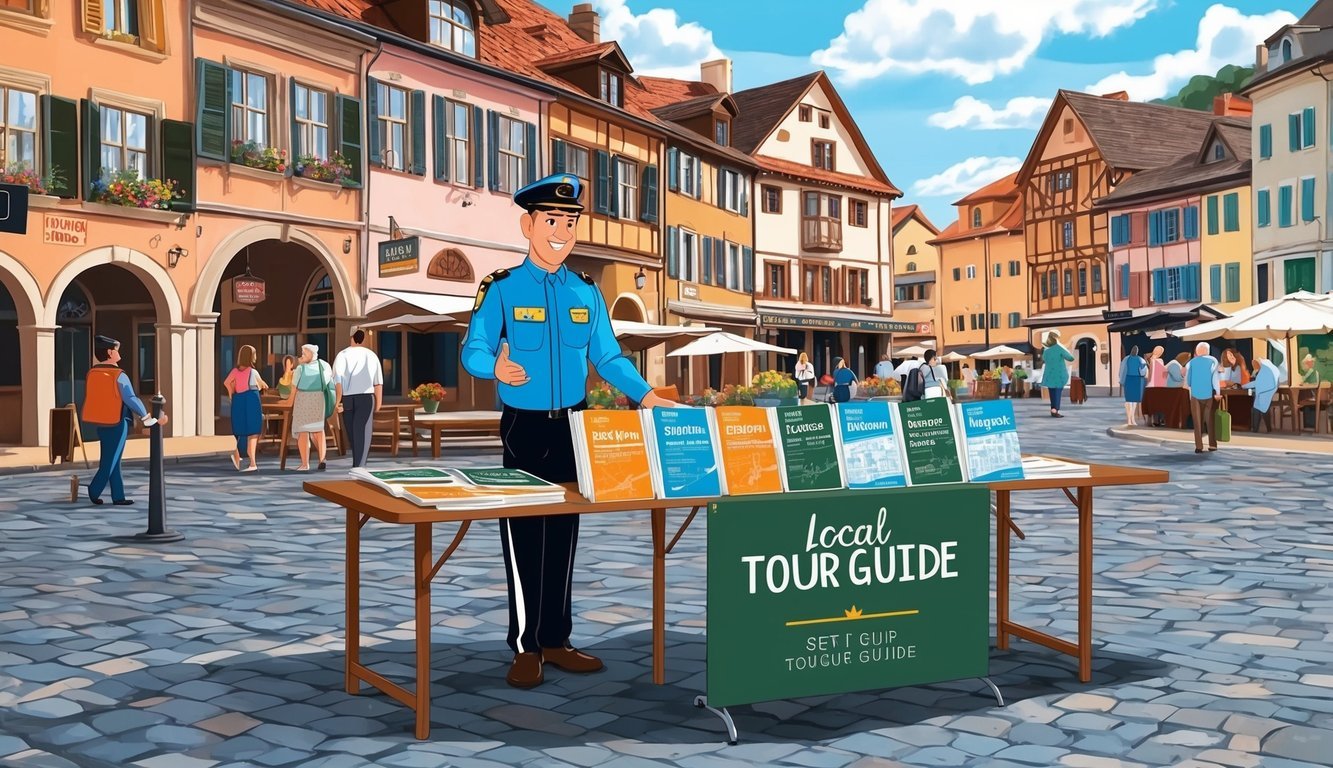Looking for a fun way to earn extra cash? Becoming a local tour guide might be the perfect side hustle for you.
If you’re passionate about your city and love sharing its hidden gems with others, this could be an exciting opportunity to turn your knowledge into profit.
As a local tour guide, you can create unique experiences for visitors while showcasing the best your area has to offer. Whether it’s leading urban hikes through historic neighborhoods or revealing little-known facts about popular landmarks, your expertise can provide value to tourists seeking authentic local experiences.
Starting your own tour business allows you to set your schedule and choose themes that align with your interests.
You might focus on food tours, architectural walks, or even specialized experiences like ghost tours or street art explorations.
The key is to find your niche and craft engaging itineraries that keep your guests coming back for more.
Key Takeaways
- You can turn your local knowledge into a profitable side hustle by becoming a tour guide
- Identifying a unique niche and creating engaging itineraries is crucial for success
- Marketing your tours effectively and managing customer relationships will help grow your business
Exploring the Side Hustle of Local Tour Guiding
Local tour guiding offers a unique opportunity to share your passion for your city while earning extra income.
It combines flexibility with the chance to meet new people and showcase your local knowledge.
Benefits of Being a Local Tour Guide
As a local tour guide, you’ll enjoy the flexibility to set your own schedule.
You can choose to lead tours on weekends or during your free time, making it an ideal side hustle.
Extra money is a significant perk.
You can supplement your income by sharing your expertise with visitors eager to explore your city.
Your travel experience grows as you interact with tourists from around the world.
You’ll gain new perspectives and broaden your cultural understanding.
Working with people becomes a rewarding aspect of the job.
You’ll meet diverse individuals and build connections while sharing your city’s hidden gems.
Understanding the Role of a Tour Guide
As a local guide, you’re the face of your city.
Your role involves more than just showing tourists around – you’re a storyteller, historian, and cultural ambassador.
You’ll need to develop strong communication skills to engage your audience effectively.
This includes speaking clearly and confidently while adapting your style to different groups.
Research and continuous learning are crucial.
Stay updated on local history, current events, and new attractions to provide the best experience for your guests.
You’ll also need to manage logistics, such as planning routes, timing stops, and ensuring group safety.
Being organized and punctual is key to success in this role.
Identifying Your Niche in Local Tours
Finding your unique angle in the local tour industry can set you apart and attract specific groups of travelers.
Focus on what makes your area special and align it with your personal interests and expertise.
Capitalizing on Local Attractions
Your city likely has well-known spots that draw visitors, but you can offer a fresh perspective.
Consider creating themed tours based on local history, architecture, or cuisine.
For example, you might craft a tour around your town’s hidden street art or lesser-known historical sites.
Think about what you’re passionate about.
Are you a foodie? Design a culinary tour showcasing local eateries.
Love nature? Develop a tour highlighting nearby parks or gardens.
Your enthusiasm will shine through and enhance the experience for your guests.
Don’t forget to research what’s already available.
You want to offer something unique that fills a gap in the market.
This could mean focusing on a specific time period or catering to niche interests like ghost hunting or local legends.
Crafting Unique Tour Experiences
To stand out, you need to offer more than just facts and figures.
Think about how you can engage all five senses and create memorable moments for your guests.
Consider incorporating interactive elements like tastings, hands-on activities, or even costumes for historical tours.
Develop itineraries that tell a compelling story about your area.
You might trace the path of a local historical figure or follow the evolution of a neighborhood over time.
Use storytelling techniques to bring the past to life and make connections to the present.
Think about ways to make your tours accessible to different groups.
Could you offer a family-friendly version with activities for kids? Or maybe a photography tour for shutterbugs? By tailoring your experiences, you’ll appeal to specific segments of travelers and build a loyal following.
Setting Up Your Tour Business

Starting a tour guide business requires careful planning and attention to legal and branding details.
You’ll need to navigate regulations and insurance while also building an online presence to attract customers.
Legal and Insurance Considerations
Before you start showing tourists around, you’ll need to cover your bases legally.
Check with your local government about any permits or licenses required for tour guides.
You might need a business license or specific certifications depending on your area.
Don’t forget about liability insurance.
It’s crucial to protect yourself and your business in case of accidents.
Look for policies tailored to tour operators that cover potential injuries or property damage.
Consider forming an LLC or corporation to separate your personal assets from your business.
This can provide additional protection if something goes wrong during a tour.
Creating a Brand and Online Presence
Your brand is how potential customers will recognize and remember you.
Choose a catchy name that reflects your tour’s focus or your local area.
Design a simple logo and use consistent colors across all your materials.
Social media platforms are essential for promoting your tours.
Create accounts on Instagram, Facebook, and TripAdvisor to showcase your experiences and connect with travelers.
Build a website to provide detailed information about your tours, pricing, and booking options.
Include high-quality photos and testimonials from happy customers.
Consider listing your tours on platforms like Viator or ToursByLocals to reach a wider audience.
Developing Engaging Tour Itineraries

Creating captivating tour itineraries is essential for a successful local guide side hustle.
Your itineraries should showcase unique experiences that blend hidden gems with local culture and history.
Highlighting Hidden Gems
Start by exploring your city’s lesser-known attractions.
Seek out charming cafes, quirky street art, or scenic viewpoints that tourists might miss. Connect with locals to discover insider spots and secret locations.
Consider including:
- Off-the-beaten-path neighborhoods
- Local markets or food halls
- Unique architectural features
- Picturesque parks or gardens
Remember to balance these hidden gems with more well-known attractions.
This mix will appeal to a broader range of tourists and create a more memorable experience.
Integrating Local Culture and History
Weave local culture and history into your tours to give them depth and authenticity.
Research interesting historical facts, legends, and cultural traditions unique to your area.
You can create engaging and informative tour itineraries by incorporating these elements.
Ideas for cultural integration:
- Visit local artisan workshops
- Include stops at historical landmarks
- Share traditional folktales or urban legends
- Recommend authentic local cuisine
Don’t just recite facts – tell stories that bring your city’s heritage to life.
This approach will make your tours more immersive and enjoyable for your guests.
Pricing Your Tours Competitively

Setting the right price for your local tours is crucial for attracting customers and earning a fair income.
You’ll need to consider the value you provide and factor in any commissions taken by booking platforms.
Determining Your Tour’s Value
When pricing your tours, start by evaluating what makes your experience unique.
Are you offering insider access to hidden gems? Do you have expert knowledge of local history or culture? These factors can justify higher rates.
Research similar tours in your area to get a baseline.
Consider the length of your tour, any costs like transportation or entry fees, and your own time and expertise.
Don’t undersell yourself – remember, you’re offering a personalized experience.
Think about offering different pricing tiers.
A basic walking tour might be your entry-level option, while a full-day experience with meals included could command a premium price.
Understanding the Impact of Commission
Many tour booking platforms take a cut of your earnings.
This commission can significantly impact your bottom line, so factor it into your pricing strategy.
For example, ToursByLocals takes a 25% commission on bookings.
If you want to earn $100 per tour, you’d need to price it at $133.33 to account for their cut.
Some platforms allow you to set your own rates, giving you more control.
Others might have fixed pricing structures.
Be sure to read the terms carefully before signing up.
Consider offering direct bookings through your own website or social media to avoid commissions entirely.
This can allow you to offer more competitive prices or increase your profit margin.
Marketing Your Tours Effectively
Promoting your local tours effectively can make or break your side hustle.
By tapping into online platforms and communities, you can reach potential customers and showcase what makes your tours unique.
Leveraging Social Media Platforms
Social media is a powerful tool for tour guides.
Create eye-catching posts on Instagram showcasing the highlights of your tours.
Use Facebook to share customer testimonials and behind-the-scenes glimpses.
Twitter can be great for quick updates and interacting with tourists.
Don’t forget about visual platforms like TikTok and YouTube.
Short, engaging videos can give potential customers a taste of what they’ll experience. Utilize online platforms like these to reach a wider audience.
Remember to use relevant hashtags and location tags to increase visibility.
Engage with your followers by responding to comments and messages promptly.
Connecting with Travel Communities Online
Join online travel forums and communities where tourists seek advice. Websites like ToursByLocals can help you connect with travelers looking for unique experiences.
Participate in discussions, offer helpful tips, and subtly promote your tours when appropriate.
Consider partnering with local hotels, hostels, and tourist information centers.
They often recommend tours to their guests.
You can offer them a commission for referrals.
Create a professional website or listing on platforms like Vayable.
Include detailed descriptions of your tours, pricing, and booking information.
Encourage satisfied customers to leave reviews on these platforms to build credibility.
Managing Bookings and Customer Relations

Effective booking management and customer service are crucial for a successful local tour guide side hustle.
You’ll need to balance scheduling, clear communication, and delivering exceptional experiences to keep your clients happy and coming back for more.
Efficient Scheduling and Communication
Set up an online booking system to streamline your scheduling process.
Use platforms like Calendly or SimplyBook.me to let clients book tours at their convenience.
This gives you a flexible schedule and allows you to work from home when not leading tours.
Keep your availability up-to-date to avoid double bookings.
Also, respond promptly to inquiries and booking requests, ideally within 24 hours.
Send confirmation emails with tour details, meeting points, and what to bring.
Include your contact information for any last-minute questions.
Consider using a customer relationship management (CRM) tool to track client preferences and special requests.
This helps personalize future tours and build lasting relationships.
Delivering Exceptional Service
Arrive early at the meeting point to greet your clients.
Dress professionally and wear a name tag for easy identification.
Start the tour with a brief introduction and outline of what to expect.
Be enthusiastic and engaging throughout the experience.
Tailor your commentary to your group’s interests.
Also, ask questions to gauge their knowledge and preferences.
Be prepared for unexpected situations.
Carry a first-aid kit, extra water, and umbrellas for sudden weather changes.
End the tour on a high note with recommendations for local restaurants or attractions.
Then, invite clients to leave reviews on your chosen online platforms.
Follow up with a thank-you email and request feedback.
Use constructive criticism to improve your services and enhance future travel experiences for clients.
Handling Finances and Passive Income Opportunities

Managing your tour guide side hustle finances effectively can maximize your earnings.
By tracking expenses and exploring additional revenue streams, you’ll create a more profitable and sustainable business.
Tracking Earnings and Expenses
Keep meticulous records of your tour income and costs.
Use a simple spreadsheet or accounting software to track every dollar earned and spent.
List your common expenses:
- Transportation costs
- Marketing materials
- Insurance
- Permits and licenses
Set aside a portion of your earnings for taxes.
As a self-employed tour guide, you’re responsible for paying quarterly estimated taxes.
Consider opening a separate bank account for your side hustle.
This makes it easier to track business finances and simplifies tax preparation.
Regularly review your financial records.
Identify trends in your busiest months and adjust your pricing or offerings accordingly to maximize profits.
Exploring Additional Revenue Streams
Diversify your income to create more financial stability. Passive income opportunities can supplement your tour earnings when bookings are slow.
Create and sell digital city guides or e-books about your area.
These products continue to generate income without requiring your constant attention.
Offer virtual tours or webinars about your city’s history and culture.
This allows you to reach a broader audience and earn money from home.
Partner with local businesses for commissions.
Recommend restaurants, shops, or attractions and earn a percentage of sales from your referrals.
Develop merchandise related to your tours, such as custom maps or local-themed souvenirs.
Then, sell these items to tour participants for extra income.
Consider creating a YouTube channel or blog about your city.
Share insider tips and stories to attract potential clients and earn ad revenue.
Expanding Your Tour Offerings

Diversifying your tour options can set you apart from the competition and attract a wider range of customers.
By adding unique experiences and partnering with local businesses, you’ll create memorable adventures that keep visitors coming back for more.
Adding Unique Experiential Elements
Consider incorporating interactive activities into your tours to make them more engaging.
You could offer hands-on workshops led by local artisans, allowing visitors to create their own souvenirs.
Think about adding themed tours, like ghost walks or food tasting experiences, to appeal to different interests.
Try organizing scavenger hunts or photo challenges throughout the tour route.
This encourages participants to interact with their surroundings and creates lasting memories.
You might even consider offering tours at unusual times, like sunrise or midnight, to provide a fresh perspective on familiar sights.
Don’t forget about incorporating technology.
Augmented reality apps or QR codes can enhance the tour experience by providing additional information or interactive elements at various stops.
Collaborating with Local Businesses
Partnering with local establishments can greatly enhance your tour offerings.
Reach out to restaurants, cafes, and shops along your route to arrange special discounts or exclusive experiences for your tour participants.
Consider teaming up with other local tour guides who specialize in different areas.
This allows you to offer combination packages, like a city tour followed by a nature hike.
You could also collaborate with local artists or musicians to provide live performances at certain stops.
Work with local transportation companies to offer unique modes of travel, such as vintage car rides or boat tours.
These partnerships not only enhance your offerings but also help support the local economy and create a more immersive experience for your guests.
Becoming a Tour Guide in a Small Town
Small towns offer unique opportunities for aspiring tour guides.
You can showcase local charm and hidden gems that big cities often lack.
With some creativity and community involvement, you can build a thriving tour guide business in your quaint locale.
Utilizing Community Resources
Start by connecting with your local chamber of commerce or tourism board.
They can provide valuable insights into visitor demographics and popular attractions.
You might partner with local businesses to create package deals or special experiences for your tours.
Reach out to long-time residents and local historians.
Their stories and knowledge can add depth to your tours.
Consider offering themed tours based on your town’s unique history or culture.
For example, you could create a ghost tour if your town has spooky legends or a food tour featuring local specialties.
Don’t forget to leverage social media and your town’s website to promote your tours.
Many small towns have active Facebook groups where you can spread the word about your new venture.
Competing with Big City Attractions
While you may not have world-famous landmarks, your small town has its own appeal.
Focus on the intimate, personalized experiences you can offer that big city tours can’t match.
You might create urban hikes that showcase your town’s natural beauty or architecture.
Highlight the authenticity of your small-town experience.
Visitors often crave genuine interactions with locals, which you can provide.
Consider offering “day in the life” tours where guests can experience local traditions or crafts firsthand.
Collaborate with nearby towns to create regional tour packages.
This can help you compete with bigger destinations by offering more diverse experiences.
You could also develop niche tours catering to specific interests like photography, birdwatching, or local craft beer tasting.
Alternative Side Hustles for Adventure Seekers

If you’re looking for exciting ways to earn extra income beyond tour guiding, there are plenty of options that cater to your adventurous spirit.
These alternatives can provide flexibility and new experiences while allowing you to share your passion with others.
Diversifying with Recreational Activities
Have you considered becoming an outdoor fitness instructor? You could lead hiking groups, run boot camps in local parks, or teach rock climbing classes.
If water sports are your thing, try offering kayaking or paddleboarding lessons.
For winter enthusiasts, becoming a ski or snowboard instructor might be the perfect fit.
Another option is to start a photography side hustle focused on outdoor adventures.
You could sell landscape prints or offer photography tours, teaching others how to capture stunning natural scenery.
Don’t forget about organizing themed outdoor events.
Think scavenger hunts, survival skills workshops, or stargazing nights.
These unique experiences can attract both locals and tourists alike.
Partnering with Lifestyle Services
Why not become an Airbnb host with an adventure twist? Create a unique stay experience by offering guided hikes or local excursions as part of your package.
You could also partner with local adventure companies to provide exclusive discounts to your guests.
Consider starting a blog or YouTube channel about your outdoor adventures.
Share tips, gear reviews, and destination guides.
As you build an audience, you might attract sponsorships or affiliate partnerships with outdoor brands.
If you’re tech-savvy, develop a mobile app for outdoor enthusiasts.
It could feature trail maps, local wildlife guides, or weather alerts for adventurers in your area.
This combines your love for the outdoors with the growing demand for digital solutions.
Frequently Asked Questions
Starting a tour guide side hustle involves key considerations like skills, marketing, and earning potential.
You’ll need to understand the best practices for attracting tourists and be prepared for challenges that come with part-time guiding.
How can I start my own tour guide side hustle?
To start your tour guide side hustle, first research your local area and identify unique aspects you can showcase.
Develop a tour concept that stands out from existing offerings.
Create an engaging itinerary and script.
Consider getting certified or licensed if required in your area.
Set up a simple website or social media presence to promote your tours.
What are the best practices for local tour guides to attract tourists?
To attract tourists, focus on creating memorable experiences.
Offer themed tours based on history, food, or adventure that appeal to specific interests.
Leverage online platforms and social media to showcase your tours.
Encourage satisfied customers to leave reviews.
Partner with local hotels, restaurants, and tourism boards to increase visibility.
What skills are necessary to be successful as a local tour guide?
Successful tour guides need excellent communication skills and a deep knowledge of their area.
You should be able to engage diverse groups and adapt your style to different audiences.
Strong organizational skills are crucial for managing tour logistics.
Develop your storytelling abilities to make information engaging.
Being multilingual can be a significant advantage in attracting international tourists.
Is there a demand for private tour guides by solo travelers?
Yes, there’s growing demand for private tour guides among solo travelers.
Many solo tourists seek personalized experiences and local insights.
Private tours offer flexibility and customization that appeal to individual preferences.
They also provide a sense of safety and companionship for those exploring unfamiliar places alone.
How much can you potentially earn as a local tour guide?
Earnings vary widely based on location, tour type, and experience.
In popular tourist destinations, you could potentially earn $100-$300 per tour.
Part-time guides might make a few hundred dollars per week.
Full-time guides in high-demand areas can earn significantly more, especially with premium or specialized tours.
What are the challenges of working as a part-time tour guide?
Income can become inconsistent due to seasonal fluctuations.
You’ll need to manage your schedule carefully, especially if balancing guiding with other work.
Flexibility is required to deal with unexpected situations, like bad weather or difficult guests.
Staying up-to-date with local changes and continuously improving your knowledge can be time-consuming but necessary.


